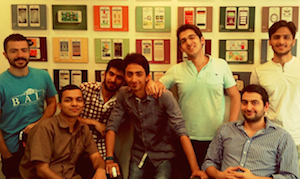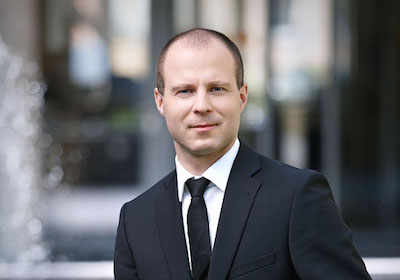
What Does This Millennial Think About Innovation: An Interview with Matthew Bingley, Client Innovation Executive of Atos
We interview people from large companies, ask questions about innovation, start- ups, intrapreneurship in order to learn how enterprises approach innovation within their organisations and externally.
In the first interview, we have Matthew Bingley from Atos. Read the interview below if you manage millennials and want to understand them better. Or If you are a millennial working in a big company and don’t think you can make a dent in the world, this interview might give you a new perspective.
Cindy Dam: Which innovators do you like and admire?
Matthew Bingley: It’s really an interesting question. Some people seem to be of the opinion that technological innovation has been largely iterative over the past 30 years and whilst we have achieve a great amount in terms of improving the quality of life, there hasn’t been any real ‘ground shaking’ innovation. I suppose these same people are arguing that the internet is an iteration on interaction and isn’t particularly revolutionary.
I personally see the world as very iterative now, but I don’t believe that these smaller tremors are not ground shaking. The advancements that we have seen the scientific field seem to be small step changes, but the collective effect of 30 years of ripples is comparable to a tsunami.
Concerning consumer technology, it does seem like everything is getting smaller, faster, and with each new release, a little bit better; but there hasn’t been an innovation that has truly changed the world. Although maybe this perspective is clouded by the sheer amount of technology around us. Maybe we are spoilt for innovation?
But to the exam question, which innovators do I admire? I suppose I could spiel off the cliché list of Steve Jobs, Elon Musk and others of that ilk, but I’d prefer to jump back 500 years. I find Da Vinci one of the most interesting inventors. Then Thomas Edison and Benjamin Franklin are incredibly interesting also. They had a vision of the world, and how it could’ve operated in a different way and then they were able to execute on those ideas with very little context.
CD: How does your typical day look like? Do you get to go around a lot, scouting new technologies, seeing new trends and convincing people to adopt new things?
MB: I have had two main roles in Atos: 1) Start-up partnership program manager and 2) Client Innovation Executive.
In my role as the Start-up partnership program manager, it was essential that I went to a lot of ‘Silicon Roundabout’ events and that I generally spent a lot of my time in Tech City (UK), meeting interesting people with interesting ideas. But I also spent a lot of time inside of my company, trying to better understand the intricacies of what we do in order to help me to align the right start-ups to the right opportunities.
As a Client Innovation Executive, I'm far more client focussed. Working with clients to drive innovation; assisting them on their journey to digital. In order to achieve this we work systematically and proactively with clients helping them to leverage emergent digital technologies to; improve the experience that they deliver to their customers, to reinvent their business models and drive operational efficiencies and excellence in their processes.
The last area that we help clients to innovate within is ‘trust and compliance’. Like ‘TeskaLabs’, we work to ensure our client’s systems and data are secure from cyber-attacks.
CD: What are some of the most rewarding things about working at Atos, doing what you do as a Client Innovation Exec?
MB: I recently read an article that proposed that ‘Millennials think that they should be changing the world,' that we have been raised by the media to think that we are special and that we should be the ones in ‘charge of the changes.' This article went on to argue that we need to ignore this kind of ‘Hollywood story,' accept our role in society and get on with our lives.
At Atos, I am fortunate enough to work with clients on very interesting challenges. The most rewarding thing is knowing that, in a way, I do get to change the world!
CD: People say that millennials have this sense of entitlement. Do you agree?
MB: Perhaps it is true. Everything that we’ve been sold in the past ten years is about ‘rags-to-riches’, the X-factor candidate coming from a poor socio-economic background who then becomes a glamourous TV star, the Hip-Hop stars who came from nothing only to become billionaires. Every story that we’ve been told centres around the person who matters the least who then ends up mattering the most.
I think this is something that has influenced the mind-set of the ‘millennial’ and I can understand that it could be a challenge for employers to keep these people motivated and interested in what they want to do.
CD: This thinking or feeling, this sense of entitlement, it’s not right or wrong, it’s more about how employers need to be aware of and understand a different kind of mind-set.
MB: Hmmm, yes – I think so.
CD: TeskaLabs operate in the mobile and Internet of Things security space, and we’d like to hear your opinions on this topic. People often roll their eyes when hearing about security. Security tends to be a dull subject and not as sexy and exciting as mobile or IoT. Innovation is the core, and security is more of an enabler for it.
MB: Security underpins innovation and makes innovation possible.
Vtech recently made the headlines due to the lack of cyber security that was built into the IoT devices they were creating.
One thing that parents are most concerned about is the security and safety of their children. If less than puritanical people are able to hack into the toys that their children are playing with and use them to communicate or to spy on them, this is clearly going to impact the level of perceived trust in the brand, despite the cool innovative tech they had created.
You can be innovative, but if you don’t pay attention to security, your innovations could come back to haunt you!
CD: Can we be innovative in the field of cybersecurity?
MB: Yes you can! With regards to people and processes, you can embed security through leveraging innovative motivational techniques like gamification, which would help to make it part of the corporate culture. Of course innovative technology can also be applied to the concept of security, like the use of Quantum Computers to detect fraud.
CD: What other cool technologies or trends will emerge in the next few years?
MB: I just alluded to the emergence of Quantum computers (QC). It is widely believed that ‘true’ QC’s will become commercially viable over the next decade, facilitating a huge increase in processing power (in certain applications) and posing a wide range of challenges and opportunities for businesses. For example, the current encryption methods that we use for secure transactions will be potentially crackable in a matter of seconds when QC’s finally emerge.
Quantum technologies are just one area of technological innovation that the Atos Scientific Community (our group of top thought-leaders) are currently investigating. For more information, please visit the home of our thought leadership - http://ascent.Atos.net
I personally also find Blockchain technology really interesting, and I feel that VR will bring huge changes to the way we relax, collaborate and learn. I also think the mobility provided by autonomous vehicles will have a knock on impact in a wide range of markets including retail (delivery), healthcare (emergency transport) and even the hospitality industry (transport home after a few pints). It's clear that we are experiencing an unprecedented change in the marketplace, and I am excited to work with our clients in preparing for these in-coming shockwaves.
Have an interesting story to share? We'd like to hear about it. Contact us. www.teskalabs.com/contact.
Most Recent Articles
You Might Be Interested in Reading These Articles

Juggling A Corporate Job and A Side Business - Part 2
An interview with Mia Bennett, Head of Alliances and Special Projects, PwC, is a part of a series of interviews on enterprise innovation with corporate intrapreneurs, technology enthusiasts and visionaries within some of the world's largest companies.
Published on May 17, 2016

Security Researcher Filip Chytry: Online Security Is an Unattractive Topic - until People Get Hacked
I studied at Applied Cybernetics school and worked on various fields: robotics, networks and programming. There I got curious about security and became increasingly passionate about the industry, trying to learn more about cyber crime and attempting to hack into my classmates‘ computers for fun.
Published on August 20, 2015

Security Architect Jiri Kohout: It's up to Us to Define How Secure The Internet Will Be
The security of connected applications, IoT, or mobile platforms, is based not only on secure development, but also on widespread knowledge about info security. Every user should have minimum knowledge about security. Every public tender should demand security of the final product or service.
Published on September 15, 2015
